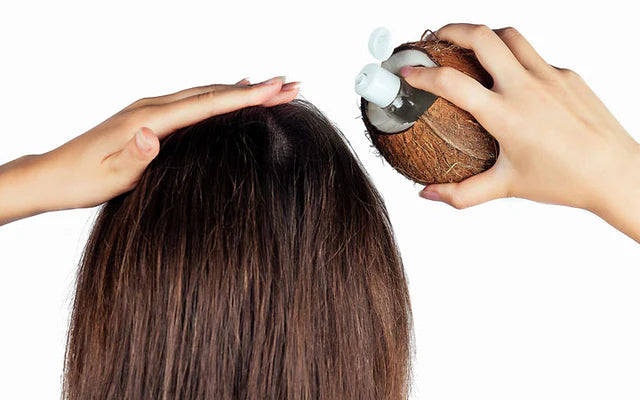Posted by Spectra Kuwait
on July 04, 2023

Hair oils have been used to stimulate hair growth for generations. It may have been some of our childhood rituals to sit in between our mother's knees and wait (semi) patiently as she parted and oiled our scalp.
This trend may have been blown up on TikTok recently, but the scalp oiling practice itself isn’t new.
It has been practised for many centuries and is popular amongst Indian cultures.
Many TikTokers have been using a variety of oils to “oil” their scalps and hair. Argan oil, jojoba oil and rosemary oil are among the most commonly used oils.
This practice has been used in India for centuries and is recommended in Ayurvedic medicine.
Hair oiling has spread beyond Ayurvedic practices, and many use it to maintain the health and vibrancy of their hair. It may even reduce hair loss, according to some experts.
WHAT IS SCALP OILING?
Scalp oiling is the practice of applying oil onto the scalp and strands to deliver intense moisture, strengthen roots, encourage hair growth and promote general hair health.
Massaging oil into the scalp also improves blood flow, releases itchiness and prevents dandruff + dermatitis. Coating your ends in an oil of choice is an easy way to nourish and rejuvenate your mane and add extra shine and volume.
Hair oiling may soften the hair and provide vitamins and minerals that get stripped from frequent washing.
There are also specific techniques to hair oiling, as well as different oil types you can use to get particular benefits.
Have you been oiling your hair the right way?
Applying hair oil at a superficial level will just leave you with a greasy scalp and do nothing for your hair. Knowing the right way of oiling is important for your hair to be able to reap all its benefits.
Is It Important To Oil Your Hair?
Nourishing your hair with oil is like keeping your body healthy and nourished with food. You should feed your hair with oil every now and then to make sure it stays healthy, thick and lustrous.
Hair oiling protects your hair follicles from damaging surfactants by lining the gaps of your cuticle cells. Oiling prevents hydral fatigue of your hair strands and reduces the hair damage caused by chemical products.
some of the benefits of hair oiling:
- Adds nutrients and vitamins to the scalp and hair follicles.
- Strengthens hair folliclesto promote hair growth and lustrous hair.
- Reduces frizz.
- Nourishes hair roots and keeps hair soft and hydrated.
- Essential oils like tea tree oil and rose oil target specific scalp and skin issues.
- Prevents dandruff.
- Prevents premature greying of hair.
- Offer stress relief.
- Reduces the risk of lice.
- Fights hair fall.
HOW DO I OIL MY SCALP?
- Detangle and smooth hair with a brush. You need to get rid of any knots and tangles. This helps stimulate the scalp and improve blood flow.
- Apply 1-2 drops to each section of your scalp. You don’t want to soak your scalp in oil. Repeat this process until your whole scalp is covered.
- Don’t forget those sad split ends - they desperately need some TLC too. Use 2-3 drops on each section and twist them to ensure that they’re covered properly.
- Put your hair in a protective hairstyle. Some people braid their hair.
- Leave it on for 2-4 hours if you have long, thick hair). For thin hair one hour will do.
How Often to Oil Your Scalp
How often you use oil depends on your hair, lifestyle, and most importantly, your scalp. Some may need to hydrate once a week while others may need to every day. For people with psoriasis or seborrheic dermatitis, It’s better to use a medicated scalp oil.
When properly used, oils should never promote build-up on the scalp.
Mistakes To Avoid While Oiling Your Hair
1. Don’t Comb Your Hair Right After Oiling It
2. Don’t Wash Too Soon
3. Don’t Overuse The Oil
4. Don’t Tie Your Hair Up
5. Don’t Wrap With A Towel
6. Don’t Overuse Your Shampoo
Should You Apply Oil To Dry Hair Or Wet Hair?
Oil repels water. If you apply oil to wet hair, water will repel it and won’t allow for deep penetration. This will make it ineffective.
Water forms a layer on your hair and scalp that does not allow the oil to pass through it. Hence, you must ideally apply oil to dry hair for it to be able to nourish the deeper layers of your scalp and hair.